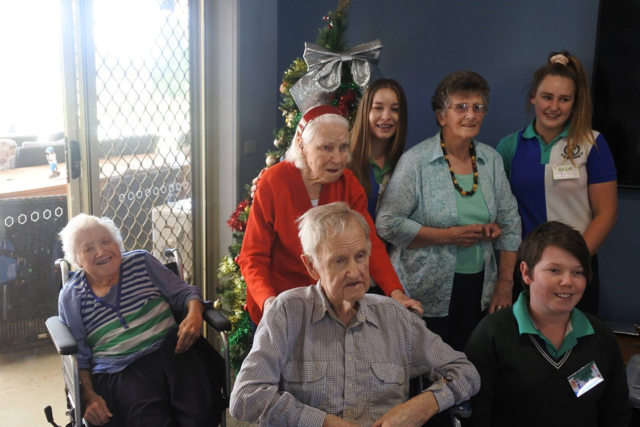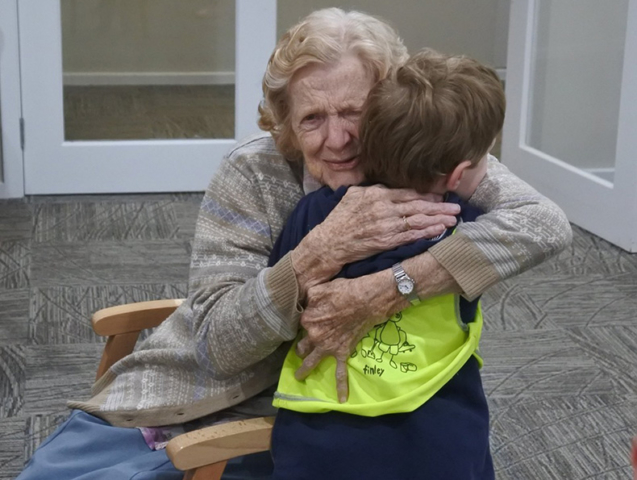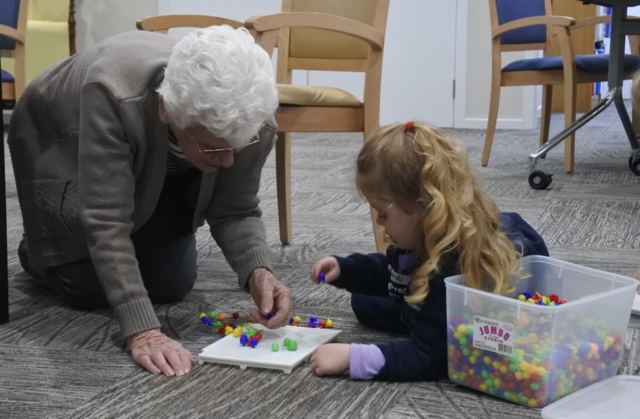Bringing together young people and old people has mutual benefits – especially when it happens in an aged care setting. Intergenerational programs are becoming more widespread in aged care facilities in Australia, and it’s easy to see why. These programs encourage relationship-building between the generations, and enhance the overall wellbeing of both the young and old participants. Both age groups bring new energy, enthusiasm and knowledge to each other’s lives, and react with joy and excitement to each other’s presence. Research has shown that these interactions bring fantastic benefits to each generation, with these positive relationships being at the heart of better physical and mental health, higher levels of satisfaction, plus the ability to learn and grow.
Addressing the problems of an ageist society
Older generations are commonly undervalued by modern society, and often experience negative stereotyping and an absence from popular media that is telling. All too often, young people have little or no interaction with old people, and tend to overlook the stories and issues of older people. We live in a society which effectively separates young and old people for the most part, and provides limited opportunities for interaction between the two age groups.
This is causing both groups to miss out on the benefits of spending time with each other. The positive benefits of relationships between young and old people are becoming more and more well known. What most of us have to realise, is that older people are just like us, only a bit older; they’ve been through more in their lives and thus have more wisdom, stories and life experience to share. Though our somewhat ageist society often doesn’t appreciate them, older people are incredibly valuable and deserve to be respected, valued and cherished.
Young people can learn a lot from the wisdom and experience of older people, but the same is true in reverse, with younger people having a great deal to teach people from older generations. Older people can learn a lot about modern life and technology from the younger generation, and interactions with young people can have a huge impact on the social isolation sometimes experienced by older people in aged care.
Young people undoubtedly thrive from spending time with older adults, and vice versa – but many are missing out on these benefits.
Intergenerational programs in aged care
Intergenerational interactions and contact are an extremely important way to tackle the problem of ageism in today’s society. It’s important to instil positive attitudes towards older people in young people early on, as they carry these attitudes through life. Thus, many aged care facilities are partnering with schools and childcare centres to bring together young and old people for mutually beneficial outcomes.
The ABC’s recent TV series, ‘Old People’s home for four-year olds’ was a surprise hit, and documented a seven week experiment where 21 children spent six hours a day at an aged care facility for up to four days a week. Health indicators of the older residents of the home (such as depression, mobility and balance) were measured both before and after the experiment, and the results were compelling. It’s extremely important for older people to be physically capable, and have good balance and mobility, and depression and anxiety can be quite prevalent in the ageing population. Significant improvements on all the measures were recorded, with depression almost eliminated amongst the elderly population. As well, residents showed considerable improvements in mobility, strength, balance and measures of frailty.
The children had a wonderful ability to motivate the older residents of the facility to be more active, as well as giving them something to look forward to and adding a sense of purpose to their lives. Everyone needs to feel cared for and important, and this is no different for older people. The children in the program developed genuine friendships with the aged care residents, and the two groups did all sorts of things together.
Undoubtedly children benefit from play, and it’s no different as we age. Older people can also benefit from using their minds in creative ways, as well as the exercise and social connectedness that comes with play. Play shouldn’t just be the province of children – it’s highly beneficial for all ages. Particularly as you get older, play offers improved mental health and wellbeing, increased happiness and community engagement and the opportunity to enjoy a good laugh. It helps older people forget their limitations and what’s going on in the rest of their lives and just enjoy being in the moment.
The children also derived benefits from the program, enjoying the undivided attention that the older people were able to lavish on them that they perhaps didn’t get in other areas of their life. The older people were able to teach them, correct them, play games with them and tell them stories, and the children blossomed under the gift of time, attention and care they received.
Opportunities for intergenerational contact at Finley
Here at Finley, we delight in providing our residents with the opportunity to interact in meaningful ways with the younger generation. We have regular visits from pre-school, primary school and high school students, who enjoy playing with, reading to, entertaining and interacting with our residents. The students have learnt how to interact with the older generation, while the older people enjoy the energy and enthusiasm of the children. It is evident from the joy on the faces of both age groups that our intergenerational program is definitely beneficial and a hit for both. There is always a lot of chatter and laughter between the children and the residents, with the children providing a great deal of love and happiness to the older people.





 Meet Nathan Willoughby, Executive Director of Operations
Meet Nathan Willoughby, Executive Director of Operations
